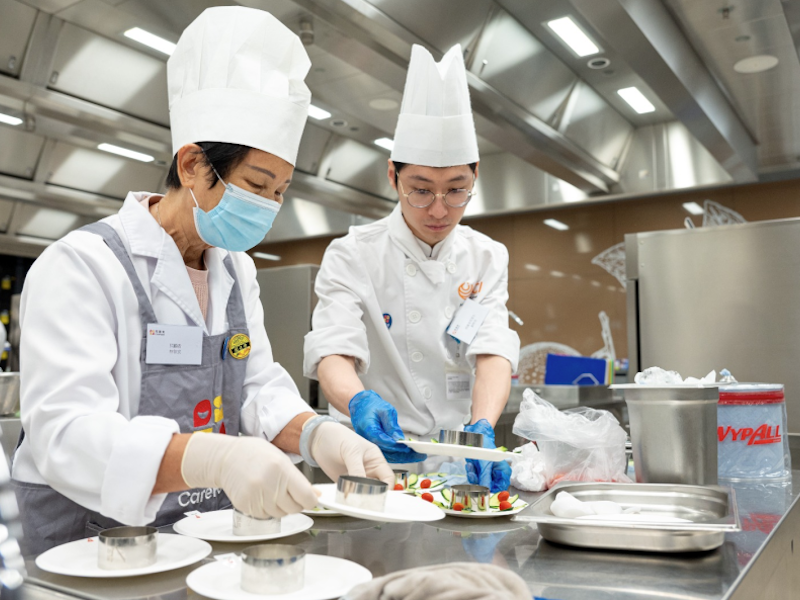Care Food: Spoonfuls of Joy for Everyone
During the COVID-19 pandemic, Karen’s mother tested positive and lapsed into a six-day coma. She showed symptoms of low blood sodium but, after regaining consciousness, had trouble swallowing regular food (Dysphagia). Her family grew anxious, since adequate nutritional intake is crucial for treating low blood sodium. Fortunately, a friend introduced Karen to soft food, also known as Care Food. After trying, her mother’s eating returned to normal. She recuperated her strength and was finally discharged from hospital.
As Hong Kong’s population continues to age, it is estimated that at least one in three people will be elderly by 2046. More and more people will suffer from swallowing problems – or Dysphagia – due to age-related functional decline, health conditions, or other reasons such as improper denture wearing. To meet this growing need, the Hong Kong Council of Social Service established the Care Food Working Group (‘Working Group’) in 2020 to advance the development and availability of Care Food in collaboration with different stakeholders.
Previously, with no unified standard for Care Food in Hong Kong, different organisations, residential care homes, and suppliers followed their own criteria and practices. To address this gap, the Working Group partnered with the Chinese University of Hong Kong’s Food Research Centre and the University of Hong Kong’s Swallowing Research Laboratory. Building on the International Dysphagia Diet Standardisation Initiative (IDDSI) and incorporating scientific data as well as locally applicable terminology, the Guideline of Care Food Standard was developed. Published in 2023, it offers caregivers and professionals a set of clear, coherent, and localised guidelines for the production and purchase of Care Food.
The project, continuing onto its second phase this year, has received funding support from its strategic partners, Kerry Group and ZeShan Foundation, to popularise Care Food and promote exchanges in the food & beverage industry. The Working Group will strengthen community outreach and public education through workshops and exhibitions. It also hopes to drive the development of Care Food Seed Restaurants through collaborations in different communities. This network of eateries will enable people with dysphagia to easily find suitable food and enjoy meals at the same table as their family, thus fostering a caring and inclusive society.
We envision a future where Care Food is available in every corner, with a range of choices offered as the industry diversifies. Caregivers will be equipped with knowledge of dysphagia and Care Food, so that if they encounter sudden challenges as Karen did with her mother, they will know how to arrange suitable meals, whether eating in or dining out. In this future, finding quality Care Food will become for everyone in Hong Kong, simply, a piece of cake.
Care Food Working Group, The Hong Kong Council of Social Service
During the COVID-19 pandemic, Karen’s mother tested positive and lapsed into a six-day coma. She showed symptoms of low blood sodium but, after regaining consciousness, had trouble swallowing regular food (Dysphagia). Her family grew anxious, since adequate nutritional intake is crucial for treating low blood sodium. Fortunately, a friend introduced Karen to soft food, also known as Care Food. After trying, her mother’s eating returned to normal. She recuperated her strength and was finally discharged from hospital.
As Hong Kong’s population continues to age, it is estimated that at least one in three people will be elderly by 2046. More and more people will suffer from swallowing problems – or Dysphagia – due to age-related functional decline, health conditions, or other reasons such as improper denture wearing. To meet this growing need, the Hong Kong Council of Social Service established the Care Food Working Group (‘Working Group’) in 2020 to advance the development and availability of Care Food in collaboration with different stakeholders.
Previously, with no unified standard for Care Food in Hong Kong, different organisations, residential care homes, and suppliers followed their own criteria and practices. To address this gap, the Working Group partnered with the Chinese University of Hong Kong’s Food Research Centre and the University of Hong Kong’s Swallowing Research Laboratory. Building on the International Dysphagia Diet Standardisation Initiative (IDDSI) and incorporating scientific data as well as locally applicable terminology, the Guideline of Care Food Standard was developed. Published in 2023, it offers caregivers and professionals a set of clear, coherent, and localised guidelines for the production and purchase of Care Food.
The project, continuing onto its second phase this year, has received funding support from its strategic partners, Kerry Group and ZeShan Foundation, to popularise Care Food and promote exchanges in the food & beverage industry. The Working Group will strengthen community outreach and public education through workshops and exhibitions. It also hopes to drive the development of Care Food Seed Restaurants through collaborations in different communities. This network of eateries will enable people with dysphagia to easily find suitable food and enjoy meals at the same table as their family, thus fostering a caring and inclusive society.
We envision a future where Care Food is available in every corner, with a range of choices offered as the industry diversifies. Caregivers will be equipped with knowledge of dysphagia and Care Food, so that if they encounter sudden challenges as Karen did with her mother, they will know how to arrange suitable meals, whether eating in or dining out. In this future, finding quality Care Food will become for everyone in Hong Kong, simply, a piece of cake.
Care Food Working Group, The Hong Kong Council of Social Service




